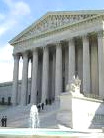|
|
|
Federal court rules against EPA
Court Watch |
2007/01/27 11:34
|
| The Environmental Protection Agency must force power plants to protect fish and other aquatic life even if it's expensive, a federal appeals court said in a ruling favoring states and environmental groups. The decision late Thursday by the 2nd U.S. Circuit Court of Appeals concluded that it was improper for the EPA to let power plants circumvent environmental laws - for instance, restocking polluted water with new fish instead of paying to upgrade their technology. It said the EPA's decisions must "be driven by technology, not cost," unless two technologies produce essentially the same benefits but have much different costs. "EPA's goal is to protect fish and the ecosystem while meeting the nation's need for reliable energy sources," said Benjamin H. Grumbles, the agency's assistant administrator for water. The agency was reviewing the decision, he said. The ruling drew praise from environmental groups and six states that had sued. |
|
|
|
|
|
|
Prosecutors urge court to restore DeLay charge
Court Watch |
2007/01/26 09:17
|
Prosecutors attempting to restore a conspiracy charge against former House Majority Leader Tom DeLay argued Wednesday that the "plain language" of Texas law means he can be charged with conspiring to violate the election code. But lawyers for DeLay and two co-defendants told the Court of Criminal Appeals that the law is clear in their view -- that conspiracy was added to the state election code after prosecutors allege the crime happened. "Historically, there have been limitations on the use of conspiracy laws," said DeLay's attorney, Dick DeGuerin of Houston. Travis County District Attorney Ronnie Earle's office is appealing lower court rulings that threw out the charge accusing DeLay and Republican fundraisers Jim Ellis and John Colyandro of conspiring to violate the Texas election code and its ban on corporate campaign contributions. It could be weeks or months before the appeals court makes a decision. DeLay and the co-defendants are still charged with money laundering and conspiracy to launder money, but state District Judge Pat Priest has said he does not have jurisdiction and cannot hold a trial until the appeals court makes its ruling. |
|
|
|
|
|
|
Prosecutors want DeLay charge reinstated
Court Watch |
2007/01/25 04:43
|
The Texas Court of Criminal Appeals heard oral arguments Wednesday on whether criminal conspiracy charges brought against former US Rep. Tom Delay were properly dismissed at trial. Charges of conspiracy to violate election law and conspiracy to commit money laundering were dismissed last December after the trial court found that the Texas campaign finance statute was explicitly extended to allow the laying of criminal conspiracy charges only after DeLay's alleged wrongful acts. In April, the Texas Third Court of Appeals affirmed that decision but refused to dismiss actual money laundering charges against DeLay. Prosecutors Wednesday asked the court to either overrule or distinguish those cases. Lawyers for DeLay argued that DeLay would not have had fair notice that his conduct was illegal at the time it occurred unless the statute then explicitly contemplated criminal conspiracy charges, which it did not, and that the legislature's subsequent amendment of the statute to include those charges showed that criminal conspiracy to violate election laws was a crime at the time of DeLay's actions. |
|
|
|
|
|
|
USDOJ Settles with Honolulu Apartment Complex
Court Watch |
2007/01/24 16:47
|
WASHINGTON - The Justice Department today reached a partial settlement with the owner, builder, architect and civil engineer of the West Loch Village, a 150-unit apartment complex in Ewa Beach, Hawaii. Today’s agreement, filed in the U.S. District Court for the District of Hawaii, partially resolves allegations of disability discrimination in the design and construction of the complex. The original complaint was filed to enforce provisions of the federal Fair Housing Act that require recently constructed dwellings to include features designed to make the dwellings more accessible to persons with physical disabilities. The Department’s suit was brought as a result of a referral to the Justice Department by the U.S. Department of Housing and Urban Development. Under the partial settlement, which must be approved by the court, the defendants, (the City and County of Honolulu; Mecon Hawaii Limited; Yamasato, Fujiwara, Higa & Associates Inc.; Hawaii Affordable Properties Inc.; and R.M. Towill Corp.) will pay all costs related to making the apartment complex accessible to persons with disabilities. The defendants must also establish a $75,000 fund which will be used to compensate individuals harmed by the inaccessible housing. The settlement also requires the defendants to undergo training on the requirements of the Fair Housing Act. "Accessible housing is a necessity for people with disabilities," said Wan J. Kim, Assistant Attorney General for the Civil Rights Division. "These types of design and construction cases reflect the Justice Department’s commitment to enforcing this nation’s fair housing laws." The United States’ claim against the City and County of Honolulu, alleging that one resident of the complex was hurt when he fell due to the design and construction defects, is not settled by this partial settlement agreement. Fighting illegal housing discrimination is a top priority of the Justice Department. In February 2006, Attorney General Alberto R. Gonzales announced Operation Home Sweet Home, a concentrated initiative to expose and eliminate housing discrimination in America. This initiative was inspired by the plight of displaced victims of Hurricane Katrina who were suddenly forced to find new places to live. Operation Home Sweet Home is not limited to the areas hit by Hurricane Katrina and targets housing discrimination all over the country. More information about Operation Home Sweet Home is available at the Justice Department Web site at http://www.usdoj.gov/fairhousing. Individuals who believe that they may have been victims of housing discrimination can call the Housing Discrimination Tip Line (1-800-896-7743), email the Justice Department at fairhousing@usdoj.gov, or contact the U.S. Department of Housing and Urban Development at 1-800-669-9777. |
|
|
|
|
|
|
Court Upholds Copyright Law on 'Orphan Works
Court Watch |
2007/01/22 22:41
|
| The US Court of Appeals for the Ninth Circuit Monday dismissed a challenge to the constitutionality of changes to copyright law made in the 1990s. The Court affirmed a lower court's dismissal of Kahle v. Gonzales, in which the plaintiffs argued that the move from an "opt-out" rather than an "opt-in" system of copyright law required a First Amendment review in order to be upheld as constitutional. Under the Copyright Term Extension Act (CTEA) of 1998, a new "opt-out" system effectively meant that copyrighted works created from 1964 to 1977 are automatically renewed. In upholding the constitutionality of the CTEA, the Court relied on the 2003 Eldred v. Ashcroft ruling in which the Supreme Court held that the CTEA did not violate the First Amendment. Monday's opinion faulted plaintiffs for making "no compelling reason" for the Court to depart from Eldred's holding and explained the Court's stance on copyright term duration as determined by weighing the impetus provided to authors by longer terms against the benefit provided to the public by shorter terms. That weighing is left to Congress, subject to rationality review. The CTEA also retroactively extended statutory copyright protection by another 20 years beyond the original term of the author's life plus 50 years, thus decreasing the number of works entering the public domain. Ownership of orphan works is often difficult to determine, and archives such as Google, Yahoo!, and academic libraries have lobbied for less stringent copyright laws in order to increase the amount of information open to the public domain. |
|
|
|
|
|
|
Former San Antonio Police Officer runs into jail time
Court Watch |
2007/01/22 12:40
|
Former San Antonio Police Officer Dean Gutierrez was sentenced today in federal court to 24 years and four months in prison for violating the civil rights of a citizen whom Gutierrez detained while on duty, the Justice Department announced today. Gutierrez was previously found guilty of sexually and physically assaulting a transgendered individual, who was 21 years-old at the time of the assault. On the night of June 10, 2005, Gutierrez detained and then drove the victim to a secluded location. Gutierrez then proceeded to beat and rape the victim. “Officers of the law bear the special responsibility of upholding justice and protecting the rights of all citizens,†said Wan J. Kim, Assistant Attorney General for the Civil Rights Division. “The defendant in this case brutally violated that responsibility. The Justice Department will continue to vigorously prosecute these cases.†The Civil Rights Division is committed to the vigorous enforcement of every federal criminal civil rights statute, such as those laws that prohibit the willful use of excessive force or other acts of misconduct by law enforcement officials. In fact, the Division has compiled a significant record on criminal civil rights prosecutions in the last six years. In fiscal year 2006, nearly 50 percent of the cases brought by the Criminal Section of the Civil Rights Division involved such prosecutions. Since fiscal year 2001, the Division has convicted 50 percent more defendants for excessive force and official misconduct than in the preceding six years. Assistant U.S. Attorney Bill Baumann and Civil Rights Division attorney Jim Felte prosecuted this case for the government. |
|
|
|
|
|
|
Supreme Court Rejects Calif. Sentencing Law
Court Watch |
2007/01/22 12:17
|
| The US Supreme Court handed down decisions in three cases Monday, including Cunningham v. California where the Court struck down as unconstitutional California sentencing rules that allow judges to exercise discretion to tack on additional years to prison sentences beyond that determined by a jury. The Court overturned a California Court of Appeal decision, holding that California's Determinate Sentencing Law allows judges to impose enhanced sentences based on a judge's, not the jury's, finding of facts and therefore violates the Sixth and Fourteenth Amendments of the US Constitution. Read the Court's opinion per Justice Ginsburg, along with a dissent from Justice Kennedy and a second dissent from Justice Alito. In the consolidated cases of Jones v. Bock and Williams v. Overton, the Court rejected rules established by the US Court of Appeals for the Sixth Circuit as to when a prisoner can file a lawsuit contesting prison conditions under the Prison Litigation Reform Act of 1995 (PLRA). According to the Court, the PLRA "requires prisoners to exhaust prison grievance procedures before filing suit," but Sixth Circuit rules concerning when a prisoner has exhausted other administrative procedures go too far: The Sixth Circuit, along with some other lower courts, adopted several procedural rules designed to implement this exhaustion requirement and facilitate early judicial screening. These rules require a prisoner to allege and demonstrate exhaustion in his complaint, permit suit only against defendants who were identified by the prisoner in his grievance, and require courts to dismiss the entire action if the prisoner fails to satisfy the exhaustion requirement as to any single claim in his complaint. Other lower courts declined to adopt such rules. We granted certiorari to resolve the conflict and now conclude that these rules are not required by the PLRA, and that crafting and imposing them exceeds the proper limits on the judicial role. |
|
|
|
|
|
|
Class action or a representative action is a form of lawsuit in which a large group of people collectively bring a claim to court and/or in which a class of defendants is being sued. This form of collective lawsuit originated in the United States and is still predominantly a U.S. phenomenon, at least the U.S. variant of it. In the United States federal courts, class actions are governed by Federal Rules of Civil Procedure Rule. Since 1938, many states have adopted rules similar to the FRCP. However, some states like California have civil procedure systems which deviate significantly from the federal rules; the California Codes provide for four separate types of class actions. As a result, there are two separate treatises devoted solely to the complex topic of California class actions. Some states, such as Virginia, do not provide for any class actions, while others, such as New York, limit the types of claims that may be brought as class actions. They can construct your law firm a brand new website and help you redesign your existing law firm site to secure your place in the internet. |
Law Firm Directory
|
|







